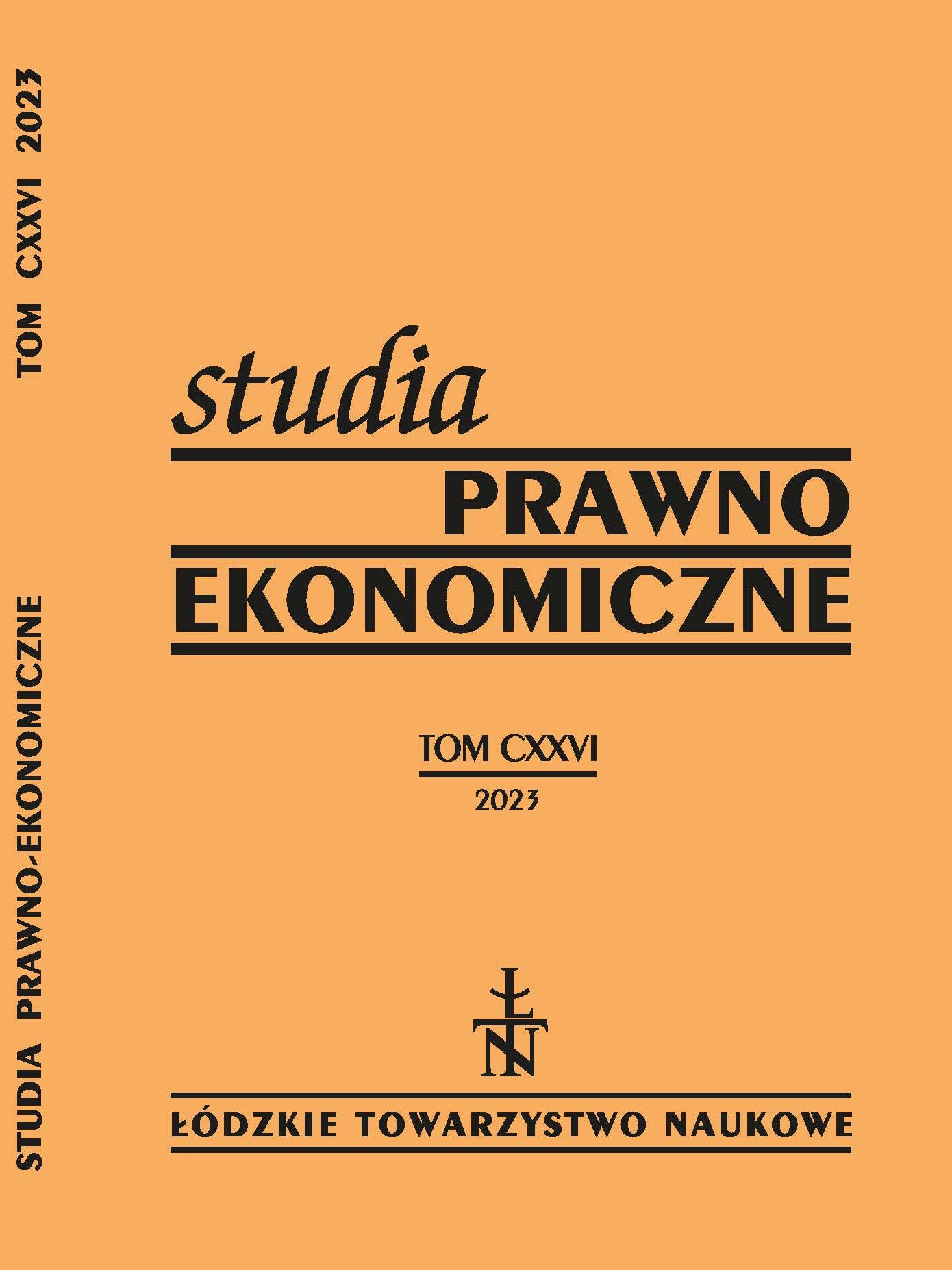Challenges related to determining for VAT purposes the status of the goods and services provider using the platform economy
DOI:
https://doi.org/10.26485/SPE/2023/126/4Keywords:
VAT, platform economy, platform provider, taxable person.Abstract
Background: The aim of the study was to analyse EU legislation and case law on the VAT status of the provider of goods and services for the platform economy. This issue is becoming increasingly important in the context of a rapidly developing platform economy, using the latest technological developments. The study conducted a comprehensive legal analysis of the issue, at the same time drawing attention to the doubts that exist particularly due to the lack of CJEU judgments on the concept of a taxable person in the platform economy.
Research purpose: The aim of the study was not only to assess the relevant legislation or its interpretation, but above all to draw attention to the need to fill the legislative gap in the area studied, which has led, and may continue to lead, to non-uniform application of VAT rules in the EU Member States.
Methods: The study was carried out predominantly using the empirical-dogmatic method, backed by a historical method and comparative method.
Conclusions: Our analysis demonstrated that the provisions of the VAT Directive do not simply and clearly regulate whether a platform provider is a taxable person. There is also a lack of CJEU jurisprudence addressing this issue; judgments on the ‘traditional’ economy do not seem to ‘fit’ the specifics of the platform economy. In our opinion, legislative changes are needed, especially the VAT Directive, which would take into account the specifics of transactions in the platform economy. We present preliminary proposals that can be taken into account in the legislative work on the European Commission’s recently proposed provisions in this area.
Downloads
References
Baretta G., European VAT and the Sharing Economy, Wolters Kluwer, 2019.
Baretta G., The New Rules for Reporting by Sharing and Gig Economy Platforms Under the OECD and EU Initiatives, EC Tax Review 2021/1.
De Groen W.P., Kilhoffer Z., Westhoff L., Postica D., Shamsfakhr F., Digital labour platforms in the EU: Mapping and business models, European Commission, Directorate-General for Employment, Social Affairs and Inclusion, 2021, https://www.ceps.eu/wp-content/uploads/2021/06/KE-02-21-572-EN-N.pdf; accessed 16.11.2022.
De la Feria R., The EU VAT System and the Internal Market, IBFD Doctoral Series, 2009.
Hatzopoulos V., Roma S., Caring for sharing? Collaborative economy under EU law, Common Market Law Review, February 2017/54/1.
The Impact of the Growth of the Sharing and Gig Economy on VAT/GST Policy and Administration, OECD, 2021, Publishing, Paris, https://doi.org/10.1787/51825505-en
Luchetta G., Giannotti E., Poniatowski G., Rohmer B., Dale S., VAT in the digital age, report volume 2, The VAT Treatment of the Platform Economy, European Commission, Directorate-General for Taxation and Customs Union, 2022, Publications Office, https://op.europa.eu/en/publication-detail/-/publication/7181e45d-0968-11ed-b11c-01aa75ed71a1; accessed 16.11.2022.
Proposal for a Council Directive amending Directive 2006/112/EC as regards VAT rules for the digital age, COM(2022) 701 final.
Opinion of Advocate General of 28 March 1996 in case C-230/94, Renate Enkler and Finanzamt Homburg.
Opinion of Advocate General of 14 June 2007 in case C-355/06, J.A. van der Steen v Inspecteur van de Belastingdienst, ECLI:EU:C:2007:352.
Opinion of Advocate General of 22 December 2008 in case C-8/03, Banque Bruxelles Lambert SA (BBL) v Belgian State.
Opinion of Advocate General of 15 September 2022 in case C-695/20, Fenix International Limited v Commissioners for Her Majesty’s Revenue and Customs, ECLI:EU:C:2022:685.
CJEU judgement of 25 July 1991 in case C-202/90, Ayuntamiento de Sevilla and Recaudadores de Tributos de las Zonas Primera y Segunda.
CJEU judgement of 20 June 1996 in case C-155/94, Wellcome Trust Ltd and Commissioners of Customs & Excise.
CJEU judgement of 26 September 1996 in case C-230/94, Renate Enkler and Finanzamt Homburg.
CJEU judgement of 15 September 2011 in joined cases C-180/10 and C-181/10 Jarosław Słaby v Minister Finansów (C-180/10) and Emilian Kuć and Halina Jeziorska-Kuć v Dyrektor Izby Skarbowej w Warszawie, ECLI:EU:C:2011:589.
CJEU judgement of 19 July 2012 in case C-263/11 Ainārs Rēdlihs v Valsts ieņēmumu dienests, ECLI:EU:C:2012:497.
CJEU judgement of 17 October 2019 in case C-692/17 Paulo Nascimento Consulting – Mediação Imobiliária Lda v Autoridade Tributária e Aduaneira, ECLI:EU:C:2019:867.
The list of entities registered for VAT, non-registered and deleted from and reintroduced to the VAT register, https://www.podatki.gov.pl/wykaz-podatnikow-vat-wyszukiwarka; accessed 16.11.2022.
VAT Committee, Working paper, no 878, VAT treatment of sharing economy, Brussels, 22 September 2015, https://circabc.europa.eu/sd/a/878e0591-80c9-4c58-baf3-b9fda1094338/878%20-%20VAT%20treatment%20of%20sharing%20economy.pdf; accessed 16.11.2022.
VIES VAT number validation, https://ec.europa.eu/taxation_customs/vies/#/vat-validation; accessed 16.11.2022.








